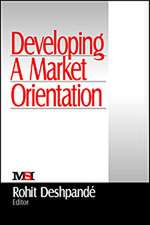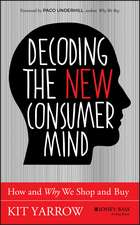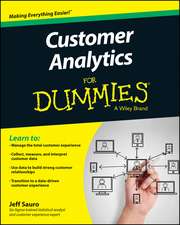The Handbook of Marketing Research: Uses, Misuses, and Future Advances
Autor Rajiv Grover, Marco Vriensen Limba Engleză Hardback – 16 aug 2006
Preț: 1097.91 lei
Preț vechi: 1503.99 lei
-27% Nou
Puncte Express: 1647
Preț estimativ în valută:
210.09€ • 224.65$ • 175.16£
210.09€ • 224.65$ • 175.16£
Carte tipărită la comandă
Livrare economică 17 aprilie-01 mai
Preluare comenzi: 021 569.72.76
Specificații
ISBN-13: 9781412909976
ISBN-10: 141290997X
Pagini: 720
Ilustrații: Illustrations,
Dimensiuni: 178 x 254 x 44 mm
Greutate: 1.41 kg
Ediția:1
Editura: SAGE Publications
Colecția Sage Publications, Inc
Locul publicării:Thousand Oaks, United States
ISBN-10: 141290997X
Pagini: 720
Ilustrații: Illustrations,
Dimensiuni: 178 x 254 x 44 mm
Greutate: 1.41 kg
Ediția:1
Editura: SAGE Publications
Colecția Sage Publications, Inc
Locul publicării:Thousand Oaks, United States
Recenzii
"This handbook comprehensively explores approaches for delivering market insights for fact-based decision-making in a market-oriented firm. Divided into four parts, it addresses: (1) the different nuances of delivering insights, (2) quantitative, qualitative, and online data gathering techniques, (3) basic and advanced data analysis methods, and (4) the substantial marketing issues that clients are interested in receiving through marketing research. It is a valuable resource for all studetns and instructors of marketing research."
"Grover and Vriens have blended the contributions of 48 well-qualified academics and professionals to produce a comprehensive, in-depth guide to modern market research. A unique feature of this work is its emphasis on the potential of market research as a generator of marketing insights, this positioning market research as a trusted adviser. This handbook can serve as an up-to-date reference for market research suppliers as well as a guide for users. Highly Recommended."
"In addition to discussing relevant content, the various contributors to the book are excellent communicators. Sentences are clear, paragraphs are coherent, and chapters fulfill the promise of their introductions, and readers will benefit from the diagrams, figures, and charts that are used to enhance the text. I enjoyed reading this book and recommend it highly. This book will be of particular interest to advanced students, academics, and practitioners. Although statistical background is necessary to comprehend the advanced analytical techniques, most readers are likely to benefit from the overviews provided in this well-written book."
—Guldem Gokcek, JOURNAL OF MARKETING
"Grover and Vriens have blended the contributions of 48 well-qualified academics and professionals to produce a comprehensive, in-depth guide to modern market research. A unique feature of this work is its emphasis on the potential of market research as a generator of marketing insights, this positioning market research as a trusted adviser. This handbook can serve as an up-to-date reference for market research suppliers as well as a guide for users. Highly Recommended."
"In addition to discussing relevant content, the various contributors to the book are excellent communicators. Sentences are clear, paragraphs are coherent, and chapters fulfill the promise of their introductions, and readers will benefit from the diagrams, figures, and charts that are used to enhance the text. I enjoyed reading this book and recommend it highly. This book will be of particular interest to advanced students, academics, and practitioners. Although statistical background is necessary to comprehend the advanced analytical techniques, most readers are likely to benefit from the overviews provided in this well-written book."
—Guldem Gokcek, JOURNAL OF MARKETING
Cuprins
Introduction: The Changing World of Marketing Research - Rajiv Grover
Acknowledgments
PART I: Foundational Design
1. Trusted Adviser: How It Helps Lay the Foundations for Insights - Rajiv Grover and Marco Vriens
2. Structuring Market Research Departments and Processes for Optimal Impact - Marco Vriens and Rajiv Grover
3. What Do "Really Good" Managers and "Really Good" Researchers Want of One Another? - Lindsay Zaltman and Gerald Zaltman
PART II: Data Collection
4. Deep Engagement With Consumer Experience: Listening and Learning With Qualitative Data - Eric J. Arnould and Amber Epp
5. Questionnaire Design and Scale Development - Naresh K. Malhotra
6. Response Biases in Marketing Research - Hans Baumgartner and Jan-Benedict E. M. Steenkamp
7. Online Marketing Research - Jeff Miller
8. Advanced Techniques and Technologies in Online Research - Scott M. Smith, Jared Smith, and Chad R. Allred
9. Sampling and Weighting - Dan Mallett
10. Dealing With Missing Data in Surveys and Databases - Marco Vriens and Sandip Sinharay
PART III: Analysis and Modeling
11. Basic Data Analysis - Scott M. Smith and Gerald S. Albaum
12. Marketing Decision Support Models: The Marketing Engineering Approach - Gary L. Lilien and Arvind Rangaswamy
13. Using Regression to Answer "What If" - Donald R. Lehmann
14. Advance Regression Models - Raghuram Iyengar and Sunil Gupta
15. Conjoint Analysis: Understanding Consumer Decision Making - David Bakken and Curtis L. Frazier
16. Construction of Efficient Designs for Discrete Choice Experiments - Warren F. Kuhfeld
17. Structural Equation Modeling - Victoria Savalei and Peter M. Bentler
18. Cluster Analysis and Factor Analysis - Subhash Sharma and Ajith Kumar
19. Latent Structure Regression - Wayne S. DeSarbo, Wagner A. Kamakura, and Michel Wedel
20. Hierachical Bayes Models - Greg M. Allenby and Peter E. Rossi
21. Hazard/Survival Models in Marketing - Pradeep K. Chintagunta and Xiaojing Dong
22. An Introduction to Data Mining - Christopher R. Stephens and R. Sukumar
PART IV: Conceptual Applications
23. Ad Testing - Allan L. Baldinger and William A. Cook
24. Modeling Marketing Mix - Gerard J. Tellis
25. A Guide to the Design and Execution of Segmentation Studies - William R. Dillon and Soumen Mukherjee
26. Measuring Brand Equity - Kevin Lane Keller
27. Customer Satisfaction Research - Richard L. Oliver
28. Measuring Customer Equity and Calculating Marketing ROI - Roland T. Rust, Katherine N. Lemon, and Valarie A. Zeithaml
29. Customer Lifetime Value - V. Kumar
30. International Marketing Research - V. Kumar
31. Marketing Management Support Systems and Their Implications for Marketing Research - Gerrit H. Van Bruggen and Berend Wierenga
Author Index
Subject Index
About the Editors
About the Contributors
Acknowledgments
PART I: Foundational Design
1. Trusted Adviser: How It Helps Lay the Foundations for Insights - Rajiv Grover and Marco Vriens
2. Structuring Market Research Departments and Processes for Optimal Impact - Marco Vriens and Rajiv Grover
3. What Do "Really Good" Managers and "Really Good" Researchers Want of One Another? - Lindsay Zaltman and Gerald Zaltman
PART II: Data Collection
4. Deep Engagement With Consumer Experience: Listening and Learning With Qualitative Data - Eric J. Arnould and Amber Epp
5. Questionnaire Design and Scale Development - Naresh K. Malhotra
6. Response Biases in Marketing Research - Hans Baumgartner and Jan-Benedict E. M. Steenkamp
7. Online Marketing Research - Jeff Miller
8. Advanced Techniques and Technologies in Online Research - Scott M. Smith, Jared Smith, and Chad R. Allred
9. Sampling and Weighting - Dan Mallett
10. Dealing With Missing Data in Surveys and Databases - Marco Vriens and Sandip Sinharay
PART III: Analysis and Modeling
11. Basic Data Analysis - Scott M. Smith and Gerald S. Albaum
12. Marketing Decision Support Models: The Marketing Engineering Approach - Gary L. Lilien and Arvind Rangaswamy
13. Using Regression to Answer "What If" - Donald R. Lehmann
14. Advance Regression Models - Raghuram Iyengar and Sunil Gupta
15. Conjoint Analysis: Understanding Consumer Decision Making - David Bakken and Curtis L. Frazier
16. Construction of Efficient Designs for Discrete Choice Experiments - Warren F. Kuhfeld
17. Structural Equation Modeling - Victoria Savalei and Peter M. Bentler
18. Cluster Analysis and Factor Analysis - Subhash Sharma and Ajith Kumar
19. Latent Structure Regression - Wayne S. DeSarbo, Wagner A. Kamakura, and Michel Wedel
20. Hierachical Bayes Models - Greg M. Allenby and Peter E. Rossi
21. Hazard/Survival Models in Marketing - Pradeep K. Chintagunta and Xiaojing Dong
22. An Introduction to Data Mining - Christopher R. Stephens and R. Sukumar
PART IV: Conceptual Applications
23. Ad Testing - Allan L. Baldinger and William A. Cook
24. Modeling Marketing Mix - Gerard J. Tellis
25. A Guide to the Design and Execution of Segmentation Studies - William R. Dillon and Soumen Mukherjee
26. Measuring Brand Equity - Kevin Lane Keller
27. Customer Satisfaction Research - Richard L. Oliver
28. Measuring Customer Equity and Calculating Marketing ROI - Roland T. Rust, Katherine N. Lemon, and Valarie A. Zeithaml
29. Customer Lifetime Value - V. Kumar
30. International Marketing Research - V. Kumar
31. Marketing Management Support Systems and Their Implications for Marketing Research - Gerrit H. Van Bruggen and Berend Wierenga
Author Index
Subject Index
About the Editors
About the Contributors
Notă biografică
Descriere
The Handbook of Marketing Research: Uses, Misuses, and Future Advances comprehensively explores the approaches for delivering market insights for fact-based decision making in a market-oriented firm. Divided into four parts, the Handbook addresses (1) the different nuances of delivering insights; (2) quantitative, qualitative, and online data gathering techniques; (3) basic and advanced data analysis methods; and (4) the substantial marketing issues that clients are interested in resolving through marketing research.















